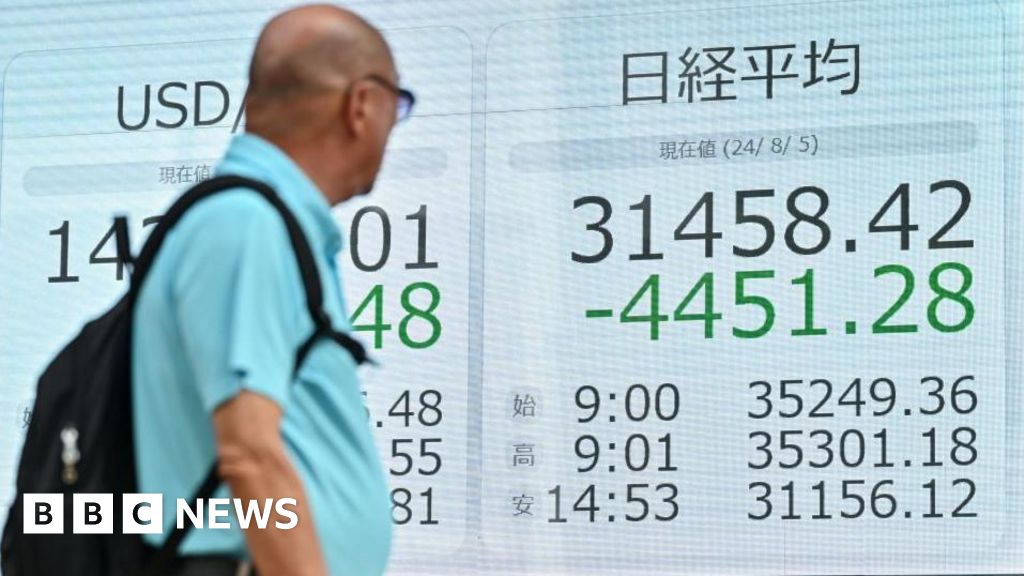Stock markets across Europe and Asia tumbled on Monday, spooked by fears that the US economy is heading for a slowdown.
In London, the FTSE 100 index opened 2.3% lower while the Euronext 100 tumbled by 3.5%.
They followed sharp falls across Asia with Japan’s Nikkei 225 dropping 12.4% or 4,451 points in the biggest fall by points in history.
It follows weak jobs data in the US on Friday which sparked concerns about the world’s largest economy.
Meanwhile, the yen has been strengthening against the US dollar since the Bank of Japan raised interest rates last week, making stocks in Tokyo more expensive for foreign investors.
Stock markets in Taiwan, South Korea, India, Australia, Hong Kong and Shanghai all tumbled.
A series of weaker-than-expected economic data from the US has fuelled speculation that the country is slowing.
At the same time, the US Federal Reserve held off cutting interest rates last week in contrast to other central banks such as the Bank of England, while major American companies such as Amazon and Intel reported disappointing financial results.
Official employment data showed that US employers added 114,000 jobs in July, far fewer than expected while the unemployment rate ticked up.
Shanti Kelemen, chief investment officer at M&G Wealth, told the BBC’s Today programme: “[There are] just some signs that potentially the market is slowing down a bit.
“I think that also spooked some people on Friday and you’re also seeing the Japanese market was already closed when that happened so you’re seeing Japan react to those things that happen last week.”
However, Kei Okamura, a Tokyo-based portfolio manager at investment firm Neuberger Berman, said that in Asia “the selloff was instigated by the sharp appreciation of the [yen] as global investors turned cautious on Japanese corporate earnings, especially that of exporters such as automakers”.
The Japanese currency has strengthened more than 10% against the US dollar over the last month.
A stronger yen makes Japanese goods more expensive, and consequently less attractive for potential overseas buyers.
Unlike other central banks, the Bank of Japan lifted interest rates last week to the highest level since the global financial crisis in 2008.
Inflation in Japan rose by more than expected in June while the economy shrank in the first three months of the year because of a weaker yen and poor household spending.
Elsewhere in the Asia-Pacific region, Taiwan’s main share index and South Korea’s Kospi both fell more than 8%.
India’s main index, the NSE Nifty 50, was trading 2.8% lower and the S&P/ASX 200 in Australia was down about 3.6%.
The Hang Seng in Hong Kong was down 2.5%, while the Shanghai Stock Exchange was 1.4% lower.
Cryptocurrencies were also down. Bitcoin dropped to around $50,000, its lowest level since February.
On Friday, stocks in New York fell sharply following the disappointing jobs data, which also showed that employment for May and June had been revised down.
The figures for July raised concerns that a long-running jobs boom in the US might be coming to an end. It stoked speculation about when – and by how much – the Federal Reserve will cut interest rates.
There are fears that the US economy will slow, despite the most recent data showing that it expanded at an annual rate of 2.8%.
Ms Kelemen, chief investment officer at M&G Wealth, said: “You can pick out evidence to create a positive story, you can also pick out the evidence to create a negative story.
“I don’t think it universally points to one direction yet.”
Stock markets were already worried about high borrowing costs and unsettled by signs that a long-running rally in share prices, fuelled in part by optimism over artificial intelligence (AI), might be running out steam.
Friday’s decline in the Nasdaq brought the index down about 10% from its most recent peak – a fall known as a “correction” – that in this case has happened in a matter of weeks.
The Dow Jones Industrial Average also dropped 1.5% on Friday, and the S&P 500 ended 1.8% lower.
Over the weekend, veteran US investor Warren Buffett’s firm Berkshire Hathaway revealed that it had sold about half its stake in US technology giant Apple.

